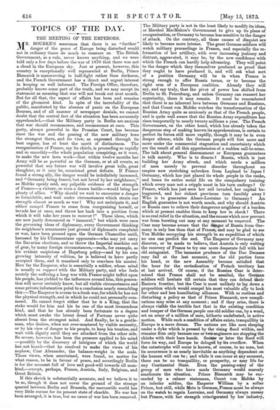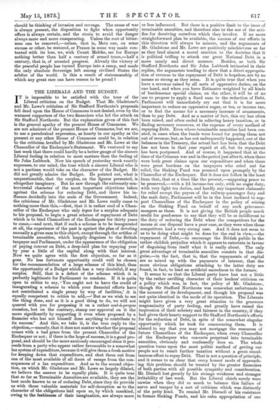TOPICS OF THE DAY.
THE MEETING OF THE EMPERORS.
H. BOURKE'S assurance that there is no "further" .111. danger of the peace of Europe being disturbed would not in ordinary times do much to reassure us. The British Government, as a rule, never knows anything, and we were told only a few days before the war of 1870 that there was not a cloud in the European sky. Just at present, however, this country is exceptionally well represented at Berlin, Prince Bismarck is manceuvring in half-light rather than darkness, and the French Government has a direct and urgent interest in keeping us well informed. The Foreign Office, therefore, probably knows some part of the truth, and we may accept its statement as meaning that war will not break out next month. But for all that, the aspect of affairs has been and remains of the gloomiest kind. In spite of the incredulity of the public, manifested by the absence of panic on the European Bourses, and of all manner of newspaper denials, we cannot doubt that the central fact of the situation has been accurately apprehended,—that the Military party in Berlin are anxious that war should recommence, and recommence at once. This party, always powerful in the Prussian Court, has become since the war and the passing of the new military laws the strongest there, and its view, as expressed through its best organs, has at least the merit of distinctness. The reorganisation of France, say its chiefs, is proceeding so rapidly and so smoothly—the whole population conspiring, as it were, to make the new laws work—that within twelve months her Army will be as powerful as the German, or at all events, so powerful that any future war will involve great toils, great slaughter, or it may be, occasional great defeats. If France found a strong ally, the danger would be indefinitely increased, and "Germany being feared, but not loved by her neighbours," as Moltke openly said, any palpable evidence of the strength of France—a victory, or even a drawn battle—would bring her plenty of allies. "Why should we wait to encounter a danger so formidable, and wait under circumstances which strain our strength almost as much as war ? Why not anticipate it, and either compel France to cease from reorganising herself, or invade her at once, and throw her back into a position from which it will take her years to recover ?" These ideas, which are now justly denounced as "immoral," but which were once the governing ideas of diplomacy, every Government thinking its neighbour's armaments just ground of diplomatic complaint or war, have been pressed upon the German Chancellor until, harassed by his Ultramontane opponents—who may yet carry the Bavarian elections, and so throw the Imperial machine out of gear, by many foreign circumstances,—such, for example, as his evident suspicions of Hapsburg policy—and by his own growing intensity of volition, he is believed to have partly accepted them, and it remained only to convince his master. How far the Emperor, who is essentially a soldier, whose mind is usually en rapport with the Military party, and who feels acutely the suffering a long war with France might inflict upon his people, has yielded to the influences around him, this genera- tion will never certainly know, but all visible circumstances and some private information point to a conclusion nearly resembling this :—The Emperor is averse to a fresh war, for which he has not the physical strength, and in which he could not personally com- mand. He cannot forget either that he is a King, that the stake would for him and his be one of the most tremendous kind, and that he has already been fortunate to a degree which must awake the latent dread of Fortune never quite absent from the strongest mind. And finally, he is a gentle- man, who desires, when not over-mastered by visible necessity, or by his view of danger to his people, to keep his treaties, and wait with dignity until they are attacked from the other side. So severe, however, has been the pressure applied to his mind —possibly by the discovery of intrigues of which the world has not heard—that he resolved to make the views of his nephew, Czar Alexander, the balance-weight in the scale. Those views, when ascertained, were found, no matter for what reason, to be in favour of peace, and accordingly Berlin is for the moment full of love and good-will towards all man- kind,—except, perhaps, France, Austria, Italy, Belgium, and Great Britain.
If this sketch is substantially accurate, and we believe it to be so, though it does not cover the ground of the strange quarrel between Berlin and Brussels, the mercantile world has very little excuse for its present state of chuckle. No war has been arranged, it is true, but no cause of war has been removed.
The Military party is not in the least likely to modify its ideas, or Marshal MacMahon's Government to give up its plans of reorganisation, or Germany to become less sensitive to the danger of attack. On the contrary, all those causes of disquiet are likely to become more intense. The great German soldiers will watch military proceedings in France, and especially the re- formation of her artillery, with ever increasing jealousy and distrust, aggravated, it may be, by the new confidence with which the French can hardly help advancing. They will point to the danger which they themselves produced as proof that they ought to have produced it, and will ask what sort of a position Germany will be in when France is strong enough to offer Russia terms, or to become the right arm of a European coalition. Already they will say, and say truly, that the pivot of power has shifted from Berlin to St. Petersburg, and unless Germany can reassert her superiority, there it may remain. It must be remembered that there is no inherent love between Germans and Russians, and that Count von Moltke watches the transformation of the Russian Army quite as anxiously as that of the French people, and is quite well aware that the Russian Army expenditure has risen temporarily to nearly twenty millions a year. The French Government, on the other hand, which has already taken the dangerous step of making known its apprehensions, is certain to perfect its forces still more rapidly, though it may be in even deeper silence, while the German people will fret more and more under the commercial stagnation and uncertainty which are the result of all this apprehension of a sudden call-to-arms. The talk about general disarmament or European guarantees is talk merely. Who is to disarm Russia, which is just building her Army afresh, and which needs a million of men merely to prevent disorder throughout an empire now stretching unbroken from Lapland to Japan ? Germany, which has just placed its whole people in the ranks, and bases its entire social life on the compulsory training which every man not a cripple must in his turn undergo ? Or France, which has just seen her soil invaded, her capital be- leaguered, and her richest provinces torn forcibly aivailt Who is to guarantee Alsace-Lorraine to Germany ?
English guarantee is not worth much, and why should Austria or Russia care to relieve their dangerous neighbour of a burden, which at present enables them to keep her in check? There is no real relief in the situation, and the causes which now prevent war from bursting out may at any moment be removed. The Czar may become aware that the &eager of Russia from Ger- many is only less than that of France, and may be glad to see Von Moltke occupying his strength in an expedition of which no one can predict the end. The Emperor of Germany may discover, or be made to believe, that Austria is only waiting the recovery of France to try one more desperate fall with her old antagonist. The immense prudence of the Due Deeazes may fail at the last moment, or the old parties force his hand, or the new Assembly become satisfied that the hour for the revindication of Frinch territory has at last arrived. Of course, if the Russian Czar is deter- mined that Frame shall not be assailed, the German soldiers will hesitate till certain that they can defend their Eastern frontier, but the Czar is most unlikely to lay down a proposition which would compel his most valuable ally to look for other and less humiliating alliances. With so restless and disturbing a policy as that of Prince Bismarck, new compli- cations may arise at any moment ; and if they arise, there is always visible the terrible fact that in the existing condition and temper of the German people one old soldier can, by a word, set an army of a million of men, hitherto undefeated, in active motion. While such a condition of affairs exists, tranquillity in Europe is a mere dream. The nations are like men sleeping under a dyke which is pressed by the rising flood within, and remains firm only because one or twn engineers are stopping the chinks with their bare hands. Socially or later the flood will force its way, and Europe be deluged by its overflow. When the catastrophe will occur is known, of course, to no man, but its occurrence is as nearly inevitable as anything dependent on the human will can be ; and while it can occur at any moment, there can be no tranquillity, or prosperity, or easy life for any Continental State. Even the passing-away of the group of men who have made Germany would scarcely ameliorate the situation. Prince Bismarck may be suc- ceeded by a calmer statesman, Count von Moltke by an inferior soldier, the Emperor William by a softer Prince, but still, while Metz is German, France must be always on the watch to regain Lorraine, and Germany always uneasy lest France, with her strength reinvigorated by her industry,
should be thinking of invasion and revenge. The cause of war is always present, the disposition to fight when opportunity offers is always certain, and the strain to avoid the danger always more and more exasperating. Unless the root of bitter- ness can be removed,—unless, that is, Metz can, on some excuse or other, be restored, or France in some way made con- tented with its loss, we, with Count Moltke, see for Europe nothing better than half a century of armed truce,—half a century, that is, of arrested progress. Already the victory of the peaceful people has turned Europe into a camp, and made the only absolute Sovereign left among civilised States the arbiter of the world. Is this a result of statesmanship of which any great race can have reason to be proud ?



































 Previous page
Previous page